Assassin's Creed: Unity criticised for widespread glitches
- Published
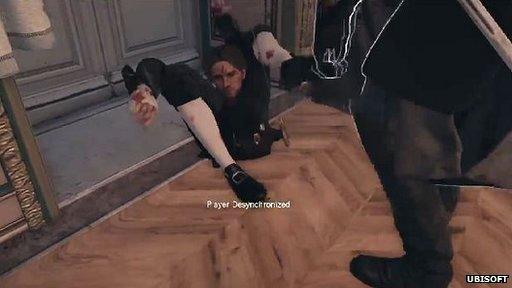
Glitches include characters bending into impossible positions and floating in the air
Wide-ranging glitches in the blockbuster video game Assassin's Creed: Unity have seen its publisher Ubisoft attacked by players, the press and its own investors.
Shares in the firm dipped by as much as 12.8% after Tuesday's launch.
It has been suggested the game was not ready for release. Ubisoft has also been criticised for delaying reviews until after the title had gone on sale.
The French company said that it was working on fixes.
"We are currently working on our next update that will help address some of the specific issues some players are having including: [the protagonist] Arno falling through the ground; game crashing when joining a co-op session; Arno getting caught inside of hay carts; delay in reaching the main menu screen at game start," it said, external.

Gamespot reported that PC users had experienced characters missing part of their faces
In a further statement, Ubisoft added that the complexity of creating a multiplayer title, in which players join forces via the internet, was the reason that the game had only became available for review relatively late in the day.
However, it did not explicitly address the point that it had made reviewers agree to an embargo time set 12 hours after the game went on sale on the east coast of the US.
Consumers have posted screenshots , externaland videos online, external, indicating that problems affect all the platforms the game has been released on: the Xbox One, PlayStation 4 and PC.
A patch was, however, provided on the launch day, external to tackle "random crashes" and some animation issues.
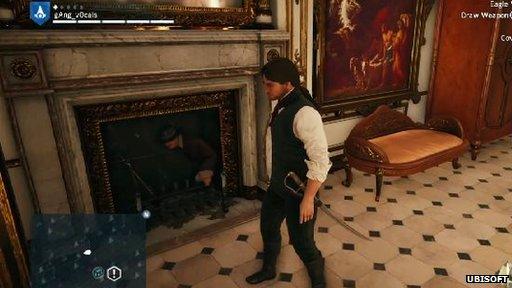
One video posted online shows a character inexplicably trapped in a fireplace
"The glitches are so bad that it's become a source of mockery," said Rob Crossley, UK news editor of Gamespot.
"There are characters that float past the screen, the main protagonist walks in the air, people are falling through the floor, people's faces are disappearing mid-kiss.
"If a publisher has proven it can't publish a game properly and displeases its core user base, then I think there are legitimate questions to be made about how well the company will fare in the future."
Released date delays
Assassin's Creed: Unity is set in the French Revolution, and its simulation of Paris streets and buildings is more complex than anything attempted in the franchise before.
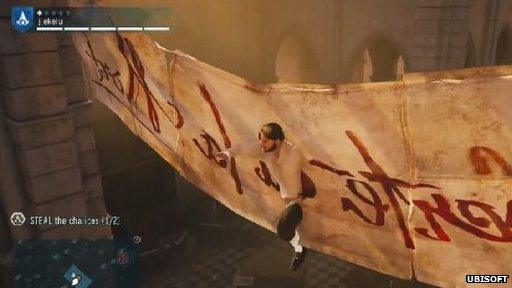
One uploaded video shows the protagonist trapped with a banner slicing through his body
It also marks the first time Ubisoft has released two core Assassin's Creed games simultaneously - the North America-based title, Assassin's Creed: Rogue, was made for last-generation consoles.
The company had been under pressure to meet the titles' scheduled release dates after announcing lengthy delays to other high-profile games: Watch Dogs, which ultimately went on sale about a year later than expected, and The Crew, which is running roughly nine months late.
"It shows that Ubisoft struggles to deliver products on the timelines that it's given, and if it does deliver them on time they may not be finished," said Mr Crossley.
"I would say that delaying a game for the sake of quality is a much more commendable solution than releasing it in fear."
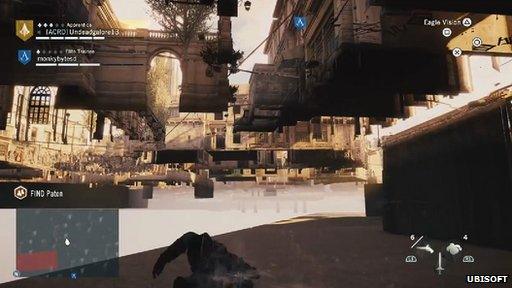
One bug allows Arno to swim under floating elements of the city
'Anti-consumer'
Video games news site Polygon has led criticism of Ubisoft's post-release embargo.
"There's no valid reason for a review embargo such as this; it's blatantly anti-consumer and likely designed to get the first rush of hardcore fans into the stores to buy their copies of the game before the reviews hit," wrote the site's editor Ben Kuchera, external.
"Any embargo past midnight the night before is sketchy as hell. It's a way to weaponise embargoes, and the best thing to do is to hold off until you can read about the game in detail."
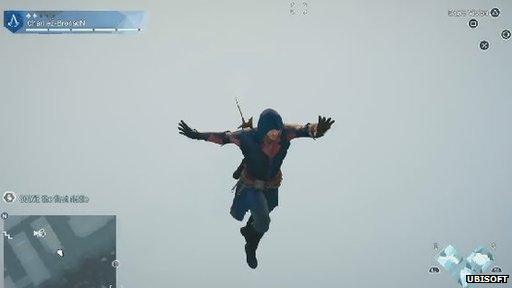
One flaw involves the lead character falling through the floor to infinite depths
Two other high-profile games - Activision's Destiny and Sony's Driveclub - also had post-release embargoes placed on them this year, while Sega did not send out any pre-release copies of Sonic Boom: Shattered Crystal at all.
All three titles subsequently received mixed scores.
But a spokeswoman for Ubisoft denied her firm had acted out of a lack of respect for customers.
"The nature of games themselves and the way they are being reviewed is changing, as evidenced by games like Assassin's Creed Unity, Destiny and The Crew - games that have significant online components," she said.

Gamers have encountered invisible walls and can hang onto ledges that are not there
"Having the online elements available and having populated worlds is essential to creating a representative and complete experience for reviewers.
"Achieving this prior to launch is incredibly complex, which is why some games are being reviewed much closer - or as was the case with Destiny, even after - the game launches.
"We are working to adapt our services and communications with consumers accordingly, both by changing the way we work with reviewers and by offering customers open betas or other early access to some games, all so that they have the information they need and want."

Gamers have suggested that the PC version of the title appears to be the most buggy
But Mr Crossley joined calls for a rethink.
"Embargoes beyond the release date instantly raises suspicions - whether they are true or not - about the quality of a game," he said.
"I don't see the logic in doing it."
- Published8 October 2014

- Published7 October 2014
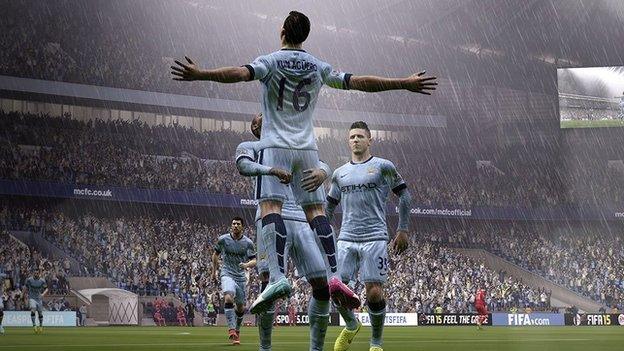
- Published16 October 2013
